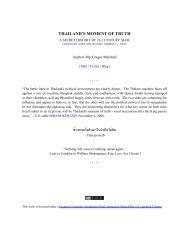THAILAND'S MOMENT OF TRUTH - ZENJOURNALIST
THAILAND'S MOMENT OF TRUTH - ZENJOURNALIST
THAILAND'S MOMENT OF TRUTH - ZENJOURNALIST
Create successful ePaper yourself
Turn your PDF publications into a flip-book with our unique Google optimized e-Paper software.
eing dependent on the rural focused bamboo radio or rice harp. They have become connected<br />
and conversant with urban worlds via television, newspapers, radios, computers/internet, DVDs,<br />
mobile and land line phones.<br />
But despite the rapid and often disorientating evolution of the country, Thai society remains deeply<br />
spiritual, at all levels. In Bangkok and in remote rural villages, in the corridors of power and among the<br />
dispossessed, most Thais still inhabit a cosmos in which there is a constant interplay between the material<br />
and supernatural realms, and in which the temple plays an essential role. As Christine Gray has written,<br />
when Thais speak to foreigners, they often self-censor themselves, leaving out references to spirits, stars,<br />
omens, offerings and rituals that they feel will not be understood or will be regarded as irrational. But<br />
the spiritual dimension of life in Thailand is very real, and it is an essential source of reverence for the<br />
monarchy.<br />
The royalist effort to recapture the political power of the palace in the decades since Bhumibol’s<br />
coronation was an explicit attempt to achieve what Malinowski had described, and put a halo of<br />
sanctity around tradition. Far from continuing a trend begun by previous Thai kings to deemphasize<br />
ancient ceremony and ritual, Bhumibol and the princes around him made a determined effort over<br />
succeeding decades to resacralize the monarchy. The practice of prostration - officially abolished by King<br />
Chulalongkorn, Rama V, in 1873 - was encouraged: the behaviour of talkshow host Woody Milintachinda<br />
in his April 2011 interview with Princess Chulabhorn is just one example of how successful this effort<br />
has been. The arcane court language of rajasap, which emphasizes the immense moral superiority of the<br />
monarch in comparison with the ordinary mortals who address him, was reintroduced. And from their<br />
earliest years, Thais were taught to revere the king:<br />
To restore the strong monarchy, the princes seized tight administrative control over education,<br />
religion, and how history is recorded and interpreted, and they injected the idea of an indivisible<br />
trinity underpinning Thai society - known as chart, sasana, phra mahakasat, or nation, religion,<br />
and king - throughout everyday life. Monarchy was the central pillar of this trinity.<br />
Meanwhile, in schools, in history lessons and books, and throughout the broadcast media,<br />
competitors to royal prestige were excised. There were no politicians, prime ministers, or<br />
statesmen to remember for their accomplishments, only Chakri kings and princes. In society<br />
there were no selfless do-gooders, save the royals; all holidays were constructed to honor the<br />
monarchy, and social institutions, schools and hospitals especially were named calculatedly to<br />
commemorate royals.<br />
This was exceptionally effective in the Thai milieu. At the time Bhumibol acceded to the throne,<br />
the country was edging towards democracy. But some four-fifths of the 18 million Thais lived<br />
on meager farms or in forests, their lives centered on the village wat, or temple, and planned<br />
around seasonal Buddhist ritual and farm schedules. With little education or sense of the modern<br />
state, the people readily accepted the idea that their well-being rested on the figure of the virtuous<br />
and inviolate Buddhist king. From him came all good, from seasonal rainfall to disaster relief<br />
to scientific innovation and above all justice, rather than from the bureaucratic government or<br />
elected representatives or constitutional laws. These were only sources of misery.




